Trade Secrets vs. Patents: Choosing the Best Protection Strategy
If you haven't read our trade secret protection guide, start there. If you have, one important issue is to determine when trade secret protection or...
11 min read
 Chris Daming, J.D., LL.M.
:
Jul. 31, 2024
Chris Daming, J.D., LL.M.
:
Jul. 31, 2024
Whether you’re an entrepreneur, a creator, or running your own LLC, there’s a good chance you’ve produced something that qualifies for copyright protection. But how do you know if it’s worth registering your work? What does a copyright actually cover? And most importantly, how do you protect your work from being stolen or used without your permission?
In this guide, we’re going to dive into the basics of copyright law, from what can be copyrighted to how to decide if you should register your work. You’ll also learn how to enforce your rights if someone copies your work, what mistakes to avoid, and how copyright protections can save your business from major headaches.
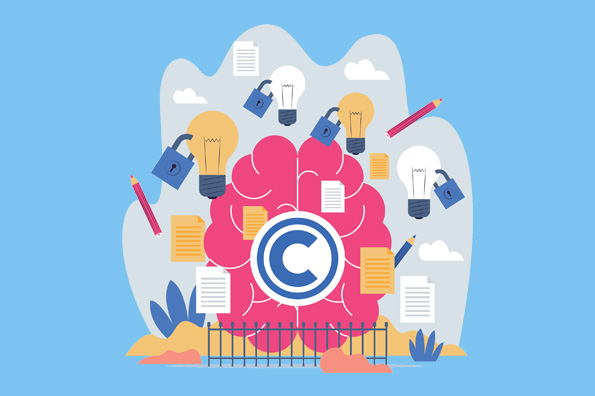

Legal GPS Pro
Protect your business with our complete legal subscription service, designed by top startup attorneys.
The main reason to register your work for copyright protection is simple: it gives you a legal safety net. While your work is automatically granted some protections as soon as it’s created, registration adds an extra layer of defense—especially if you ever decide to take legal action against someone who’s infringing on your rights.
Here’s the easiest way to think about it: Will you sue someone if they infringe on your copyright? If the answer is no, then registering your work might not make sense. But if you think there’s a chance you’d want to take legal action to protect your business, registering your work is a smart move. It gives you additional recourse in court, allowing you to claim higher damages if someone misuses your creation.
Before you jump into the registration process, it’s important to figure out if you actually have something that can be copyrighted. This comes down to three questions:
If the answer to all three is "yes," then you have something that can be copyrighted. For example, if you’ve written a book, composed a song, or designed a logo, these are original, tangible creations that required some level of creativity. All of these can be protected by copyright.
Here’s a more specific list of things you can copyright:
Master Intellectual Property for Business Success
While the list of copyrightable works is long, there are some things that can’t be protected. If your work isn’t original or isn’t tangible, you’re out of luck. Here’s what that means in simple terms:
Still unsure? Let’s break it down further. Here are some examples of things you cannot copyright:
Pro Tip: If your work isn’t tangible yet, make sure to get it down in a permanent form. For example, if you have a business idea, write it out as a detailed plan or create an original design. That way, it becomes something you can copyright.
If you’re the author or creator of the work, you’re typically also the owner of the copyright. But things can get tricky if you’ve hired someone to create work for you or if you’ve been hired to create something for someone else. Ownership of a copyright can depend on whether the work was created by an employee or an independent contractor.
Here’s how to figure out who owns the copyright in different scenarios:
If you’ve hired someone as a full-time employee and the work they’ve created is part of their job, then you, as the employer, own the copyright. This is known as a “work made for hire.”
Example: You run a marketing firm, and your full-time graphic designer creates a series of logos for your clients. Since they’re your employee and creating logos is part of their job, you own the copyrights to those logos—not the designer.
When dealing with independent contractors, things get a bit more complicated. For you to own the copyright, the work must meet two requirements:
Even if both of these conditions are met, you need to have a written agreement that states the work is a “work made for hire.” If you don’t, the contractor retains the copyright.
Example: Let’s say you hire a freelance photographer to take product photos for your website. Unless you have a contract that states the work is a “work made for hire,” the photographer retains the copyright to the photos—even though you paid for them.
Before you rush off to register your work with the U.S. Copyright Office, take a step back and consider a few key factors. The decision to register your work ultimately comes down to one question: Would it hurt your business if someone copied your work?
Ask yourself:
If the work is critical to your business and you’d stand to lose significant revenue if someone copied it, registering your copyright is a no-brainer. The reason? Copyright registration allows you to recover not just actual damages, but also statutory damages—which can range from $750 to $30,000 per infringement, even if the infringer didn’t know they were copying your work.
Pro Tip: Registering your copyright before an infringement happens makes it easier to recover more damages in court. In some cases, you can even claim up to $150,000 per infringement if you prove the infringement was intentional.
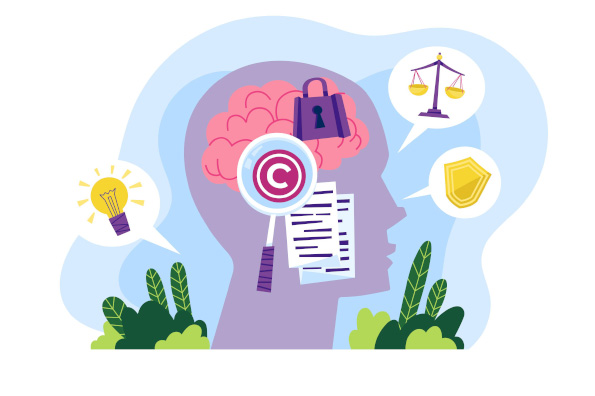

Legal GPS Pro
Protect your business with our complete legal subscription service, designed by top startup attorneys.
If you ever find yourself in a situation where someone has copied your work without permission, you have two types of damages you can recover in a lawsuit: actual damages and statutory damages.
These damages are based on the actual financial loss you’ve suffered due to someone copying or using your work. For example, if a competitor copies your online course and sells it, you could claim the revenue they earned as actual damages. However, proving these losses can be tricky. You’ll need detailed financial analysis and legal expertise to calculate how much money you’ve lost because of the infringement.
Pro Tip: While actual damages reflect real financial losses, they’re often difficult to prove and may not be worth the cost of litigation. In many cases, you’ll want to focus on statutory damages instead.
Statutory damages exist to protect copyright holders where actual damages may fall short. Congress included statutory damages in the Copyright Act to help creators defend their work. These damages range from $750 to $30,000 per infringement—and you don’t have to prove the exact financial loss to claim them.
Even better, if you can prove that the infringer knew they were copying your work and did it anyway, you could recover up to $150,000 per infringement plus punitive damages. This means that if someone intentionally copied your work and profited from it, you have a strong legal path to claim significant compensation.
If you want to take full advantage of statutory damages, it’s crucial that you register your copyright before any infringement occurs. If your work is not registered, your recovery will be limited to actual damages alone, which could leave you with much less compensation.
In fact, in most cases, you can’t even file a lawsuit for copyright infringement unless your work is registered. So, if there’s any chance you might need to protect your work in the future, registering early is a smart move.
Let’s take a look at an example to show how important copyright registration can be.
Scenario: Will wrote a book about the challenges of launching a successful app. He wanted to leverage the popularity of his app to make some extra income by selling his book. He shared the manuscript with a friend, Chet, who convinced him that he could help improve it. But instead of helping, Chet posted Will’s book on his website for free without permission.
Will didn’t think much of it at first, but when he was ready to launch the book, he realized Chet’s free version was hurting his sales. Will asked Chet to take it down, but Chet refused. Will had to wait until his copyright registration was complete to file a lawsuit against Chet.
Had Will registered his copyright earlier, he could have taken action right away, stopped the free distribution of his book, and even claimed statutory damages from Chet. But because he waited, he lost valuable time—and potential sales.
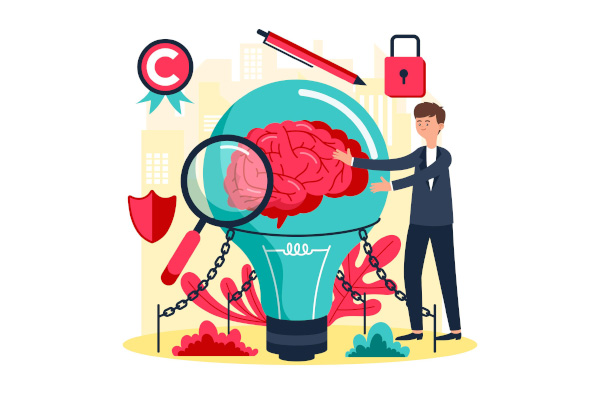

Legal GPS Pro
Protect your business with our complete legal subscription service, designed by top startup attorneys.
Registering your copyright is relatively straightforward, and it’s something you can easily do online. Here’s a step-by-step guide to getting your work registered with the U.S. Copyright Office (USCO):
Visit the USCO’s Online Portal: Start by going to the U.S. Copyright Office’s website, where you’ll find their online registration system.
Complete the Online Forms: The forms will ask for details about your work, including the title, description, and when it was created.
Enter Your Payment Information: There’s a small fee for registering your copyright, but it’s well worth the cost when you consider the protection it offers.
Upload Copies of Your Work: You’ll need to upload a digital copy of the work you want to copyright (for example, a manuscript, audio file, or video).
Once everything is submitted, the U.S. Copyright Office will review your application and, in about a month, you’ll receive a certificate verifying your copyright registration.
Pro Tip: Although it’s not legally required, it’s a good idea to mark your work with the copyright symbol ©, followed by your name and the year the work was completed. This puts others on notice that the work is protected, which can strengthen your position in future legal disputes.
Once your work is registered, you’ll want to be vigilant about protecting it from unauthorized use. Here’s how you can keep an eye on your work and respond if someone is infringing on your copyright:
There are online services available that can help you monitor the internet for duplicates of your work. These tools can scan websites, social media, and other platforms to identify potential infringement.
If you find your work on a platform like Etsy, YouTube, or Amazon, you can send a Takedown Letter to the site. Under the Digital Millennium Copyright Act (DMCA), these platforms are required to remove infringing content once they’re notified. Most major websites have dedicated sections that explain how to submit a DMCA takedown notice.
If you find your work being used on an independent website, you can send a Cease and Desist Letter directly to the site owner. This letter informs them that they are infringing on your copyright and gives them a chance to remove the content before legal action is taken.
Make sure to send the letter via certified mail and keep copies of all correspondence. It’s also a good idea to email the business a copy of the letter, ensuring you have a clear record of when they received it.
Whether you’re sending a takedown notice or a cease and desist letter, make sure to include the following information:
Pro Tip: Keep copies of all communication and monitor the website where the infringement occurred to ensure the content is removed. If they ignore your letter, you may need to escalate the situation to legal action.


Legal GPS Pro
Protect your business with our complete legal subscription service, designed by top startup attorneys.
Now that you know how to register and protect your copyright, let’s go over some common mistakes people make with copyrights—and how to avoid them.
Under Fair Use, you can use portions of copyrighted material for purposes like commentary, criticism, reporting, or education. However, Fair Use is a gray area with a lot of nuance. Just because you’re using someone else’s work for commentary doesn’t automatically mean you’re in the clear.
Factors like how much of the original work you’re using, how transformative your use is, and whether your use affects the market value of the original work will all be considered when determining if your use qualifies as Fair Use.
Example: Will, an entrepreneur, wrote an e-book about launching his app and included summaries of several books he read during his journey. He didn’t just quote the books—he condensed the key ideas and gave them away for free. Publishers of the original books sued him for copyright infringement, arguing that people who read his summaries wouldn’t need to buy the full books.
Will could have avoided this by either reaching out to the publishers for permission or ensuring that his use of their work fell within Fair Use guidelines.
Pro Tip: If you’re unsure whether something falls under Fair Use, it’s best to err on the side of caution and seek permission from the original copyright holder—especially if you’re making money off of their work.
If you allow others to post content on your website (e.g., comments, forum posts, or user profiles), you could be held liable for copyright infringement if one of your users posts copyrighted material without permission. This could range from users sharing free PDF downloads of books to posting images they don’t own.
The good news? There’s a way to protect yourself. The Digital Millennium Copyright Act (DMCA) includes “safe harbors” for website owners. As long as you take certain steps, you won’t be held responsible for copyright infringements committed by your users.
Here’s how you can protect your business:
Example: Will runs a website to help promote his app, where users can post questions and share their experiences. One user, Chet, posted links to download copyrighted e-books for free. When the publishers discovered this, they demanded Will take the content down. However, Will had previously promised never to remove user content, thinking it would make the site more transparent.
As a result, Will was sued for copyright infringement, even though he didn’t personally upload the infringing content. He could have avoided this by having the right systems in place to remove infringing content and protect his website.
Copyright protection is essential for safeguarding your original creations, whether it’s a book, a design, software, or any other type of intellectual property. By registering your work, monitoring for infringements, and taking the right steps to enforce your rights, you can ensure that your creations remain yours.
Here are the key takeaways:
Remember, protecting your work isn’t just about preventing others from copying it—it’s about securing the value of your business and your hard-earned creativity.
The biggest question now is, "Do I need a lawyer for Copyrights?” For most businesses and in most cases, you don't need a lawyer to start your business. Instead, many business owners rely on Legal GPS Pro to help with legal issues.
Legal GPS Pro is your All-In-One Legal Toolkit for Businesses. Developed by top startup attorneys, Pro gives you access to 100+ expertly crafted templates including operating agreements, NDAs, and service agreements, and an interactive platform. All designed to protect your company and set it up for lasting success.

Legal GPS Pro
Protect your business with our complete legal subscription service, designed by top startup attorneys.

100+ legal templates, guides, and expert advice to protect your business.
Trusted by 1000+ businesses
Table of Contents
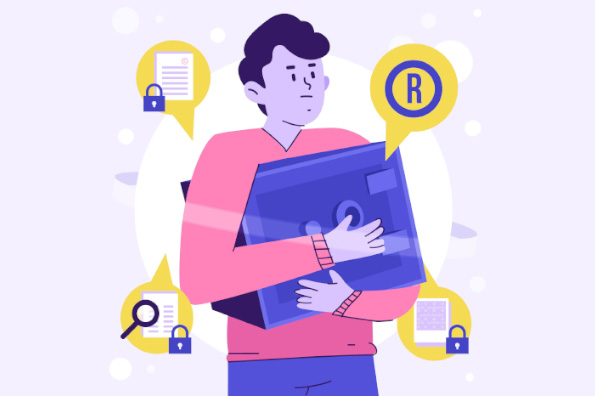
If you haven't read our trade secret protection guide, start there. If you have, one important issue is to determine when trade secret protection or...
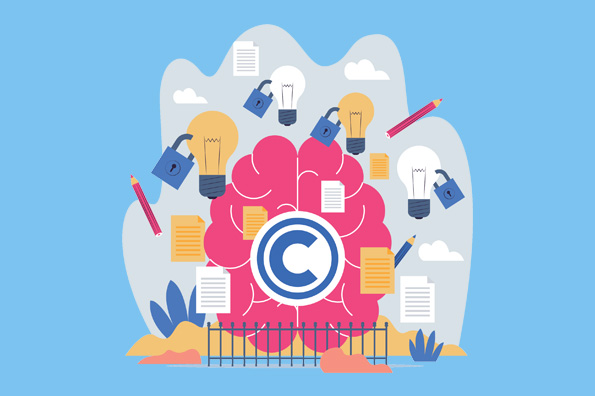
If you or another founder created any intellectual property prior to forming your company, you have to assign that IP to the company after it's...

Copyright infringement can be a serious problem, and it's essential to understand how to use others' creative works without crossing the line into...